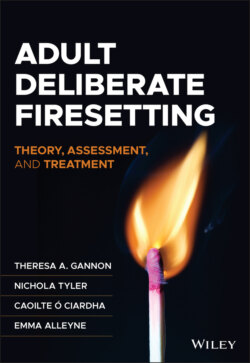Читать книгу Adult Deliberate Firesetting - Theresa A. Gannon - Страница 21
Developmental Context
ОглавлениеEarly factors—including genetic, biological, neurodevelopmental, and experiential factors—have been variously hypothesised as distal causal factors in adult firesetting. The results of Swedish population research (Frisell et al., 2011) suggests that there are genetic or early developmental influences on the commission of arson among those aged 15 years or older. To our knowledge, little additional research has been carried out to further determine the specific mechanisms through which genes may act on the psychological processes underpinning firesetting behaviour.
Research on neurobiological factors in firesetting has not advanced considerably since a review by Gannon and Pina (2010). Among the most promising research on the neurobiology of firesetting was research by Virkkunen and colleagues that implicated a role for certain neurotransmitters in distinguishing between people apprehended for arson and other offending groups as well as in predicting recidivism among people apprehended for arson (Virkkunen et al., 1987, 1989). Specifically examining the evidence of neurobiological characteristics for individuals who have set fires and have a mental disorder, Tyler and Gannon (2012) concluded that the literature is reliant on case studies or very small samples, limiting the conclusions that can be drawn.
Low IQ has been historically associated with adult firesetting. Nanayakkara et al. (2015) summarised the available evidence, concluding that while high rates of intellectual disability appeared to characterise some samples of individuals who have set fires, low IQ does not necessarily distinguish individuals who have set fires from other justice-involved individuals. A meta-analysis of four studies (predominantly adult samples) found that rates of intellectual disability among individuals with a history of firesetting appear to be less than 5% (Sambrooks et al., 2021; see also Collins et al., 2021 for a systematic review that also reports autism prevalence).
Gannon and Pina (2010) drew together literature suggesting that the developmental backgrounds of individuals who set fires are characterised by adversity. Specifically, they identified research (e.g., Bradford, 1982; McCarty & McMahon, 2005) implicating larger families, parental neglect, and sexual and physical abuse as factors differentiating young people and adults who set fires from other justice-involved individuals or from the wider population. In the decade since their review, very little research has examined whether the developmental experiences of people who set fires are markedly different to other groups. One exception is a paper by Ducat et al. (2013a), which compared a sample of men and women with convictions for firesetting offences with case files of randomly selected convicted individuals without firesetting histories. Both groups were characterised by childhood adversity but did not appear to differ meaningfully from one another. It is worth noting that there may be within-group variability in childhood adversity for people who have set fires, evidenced by the finding that individuals who set multiple fires may be characterised by greater physical and sexual abuse in childhood (Bell et al., 2018).
Taken together, the early lives of people who set deliberate fires in adulthood appear to be characterised by biological and experiential factors that differentiate them from the population of people who do not encounter the criminal justice system. There is also tentative evidence that genetic and neurobiological factors may differentiate people who set fires compared with those involved in other forms of criminality. There is less evidence of clear differences between the developmental experiences of people who set fires compared with other justice-involved individuals. Overall, the general picture of the developmental context of firesetting behaviour is of a literature that needs considerable updating with large robust studies.
